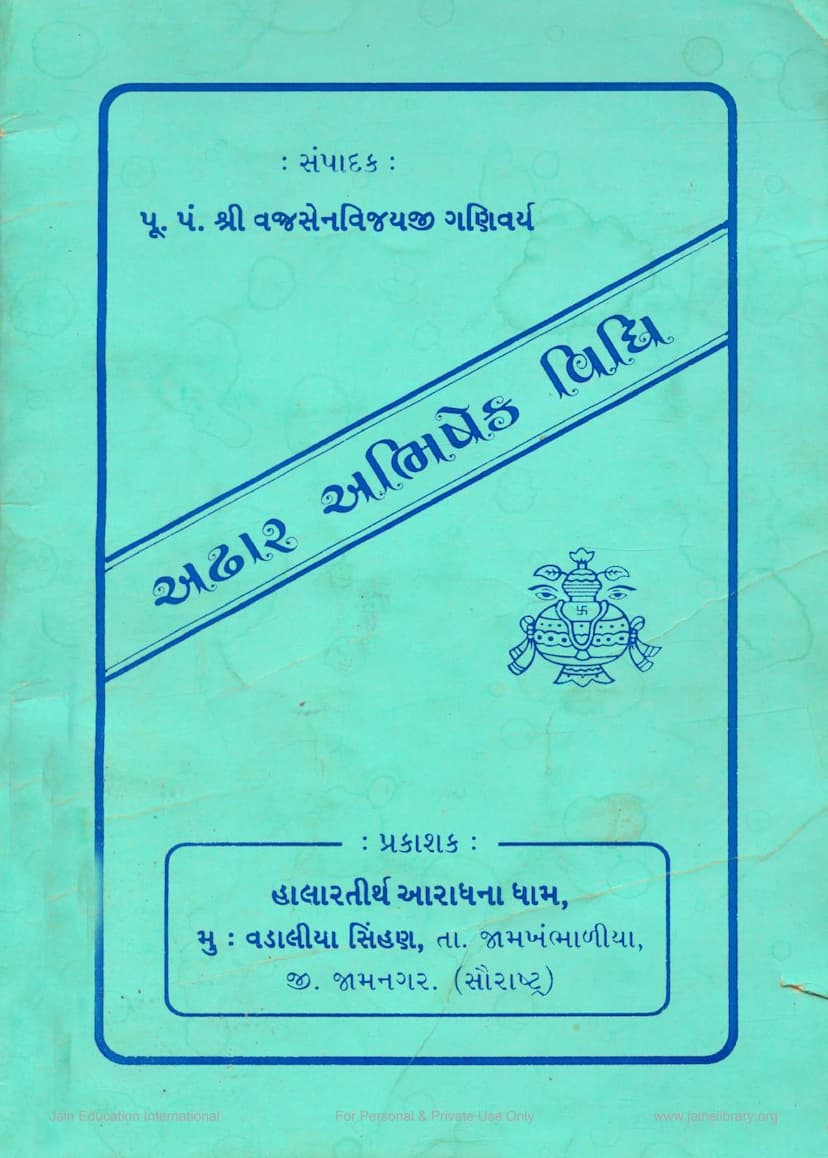Adhar Abhishek Vidhi
Added to library: September 1, 2025
Loading image...

Summary
This document, "Adhar Abhishek Vidhi" (Eighteen Abhishek Procedures), compiled by Pujya Pandit Shri Vajrasenvijayji Ganivarya and published by Halar Tirth Aradhana Dham, provides a comprehensive guide to performing the ritualistic bathing of Jain idols.
Key aspects of the book include:
- Purpose and Significance: The text emphasizes that the Abhishek (ritual bathing) is a crucial practice for purifying the soul and removing karmic impurities that may have accumulated on the idol due to unintentional lapses (ashatana). It is seen as a way to attain spiritual upliftment and connect with the divine essence of the Tirthankaras.
- Inspiration and Context: The publication of this book is linked to a significant event in Halar, where 43 Jain temples simultaneously performed the "Adhar Abhishek." The inspiration for this widespread practice came from the blessings and guidance of respected Jain monks and acharyas.
- The "Why" of Eighteen Abhisheks: The book draws parallels between the divine birth of Tirthankaras, which is celebrated with elaborate bathing ceremonies by celestial beings, and the Abhishek performed in Jain temples. It highlights that while the Tirthankaras are inherently pure, the Abhishek is for the purification of the devotees and the removal of any disrespect shown to the divine.
- The Materials Used: The Abhishek involves a variety of pure and auspicious materials, including:
- Gold
- Pancharatna (five precious gems)
- Herbal powders derived from 16 specific medicinal plants (Kashaya Churna)
- Sacred soils from eight sources (Mangal Mruttika), including riverbanks, confluences, and sacred sites.
- A total of 33 special medicinal herbs (Sadoushadhi).
- Fragrant substances like sandalwood, agar, kasturi, and camphor.
- Flowers and their parts.
- Panchagavya (five products of the cow) or Panchamrita (five nectars – milk, curd, ghee, honey, sugar).
- Water from 108 sacred pilgrimage sites and rivers.
- Saffron and sugar.
- Pure water (Tirthodak).
- Camphor.
- The Ritual Procedure: The book details the step-by-step process for each of the eighteen Abhisheks. For each type of Abhishek, it specifies:
- The mantra to be recited before starting the bath.
- The specific Sanskrit verses (shlokas) to be chanted during the bathing process.
- The appropriate mantra to be used while offering the specific substance.
- The subsequent rituals of applying tilak, offering flowers, incense, and the ringing of bells.
- Divine Connection and Benefits: The text suggests that performing the Abhishek with genuine devotion and the right intention can lead to the removal of karmic obstacles, attainment of spiritual peace, and blessings from the Tirthankaras. It mentions historical instances where the water used in Abhishek has had miraculous healing properties, such as curing diseases and removing negative influences.
- Specific Abhisheks Detailed: The book systematically describes each of the eighteen Abhisheks, starting with the golden Abhishek and progressing through various combinations of gems, herbs, soils, and aromatic substances. Each section includes the specific ingredients, the accompanying verses, and the mantra.
- Additional Rituals: Beyond the eighteen Abhisheks, the book also includes guidance on related rituals such as:
- Chandradarshan and Suryadarshan: Rituals involving showing a dream of the moon or sun to the idol, or a mirror if a dream is not applicable.
- Shantikalsash: The ritual of offering a peace pot, which involves specific procedures for preparing the pot, filling it with auspicious items, and chanting specific mantras and verses for peace and well-being.
- Chaitya Vandana and Namaskars: The traditional Jain prayers and salutations to the Tirthankaras and the monastic order.
- Aarti, Mangaldeep, and Pushpanjali: The performance of the ceremonial lamp-waving, auspicious lamp, and offering of flowers.
- Apology for Errors: The practice of seeking forgiveness for any unintentional mistakes in the ritual.
- The Role of Devotion: Throughout the text, the importance of bhavana (inner feeling or contemplation) and devotional fervor is repeatedly stressed as being as important as the ritualistic performance itself.
In essence, "Adhar Abhishek Vidhi" serves as a sacred manual for Jain devotees, guiding them through the intricate and spiritually enriching process of adorning the Jain idols with eighteen different sacred baths, thereby fostering devotion, purification, and spiritual merit.